Theories of Child Development
VerifiedAdded on 2020/10/22
|11
|2955
|373
AI Summary
This report delves into the concept of child development theories initiated by renowned researchers such as Jean Piaget, Noam Chomsky, Arnold Gesell, Friedrich Froebel, Maria Montessori, and Lev Vygotsky. The assignment highlights their key contributions to understanding cognitive, social, emotional, and physical aspects of children's development. It emphasizes the significance of applying these theories in early childhood education for effective child development.
Contribute Materials
Your contribution can guide someone’s learning journey. Share your
documents today.
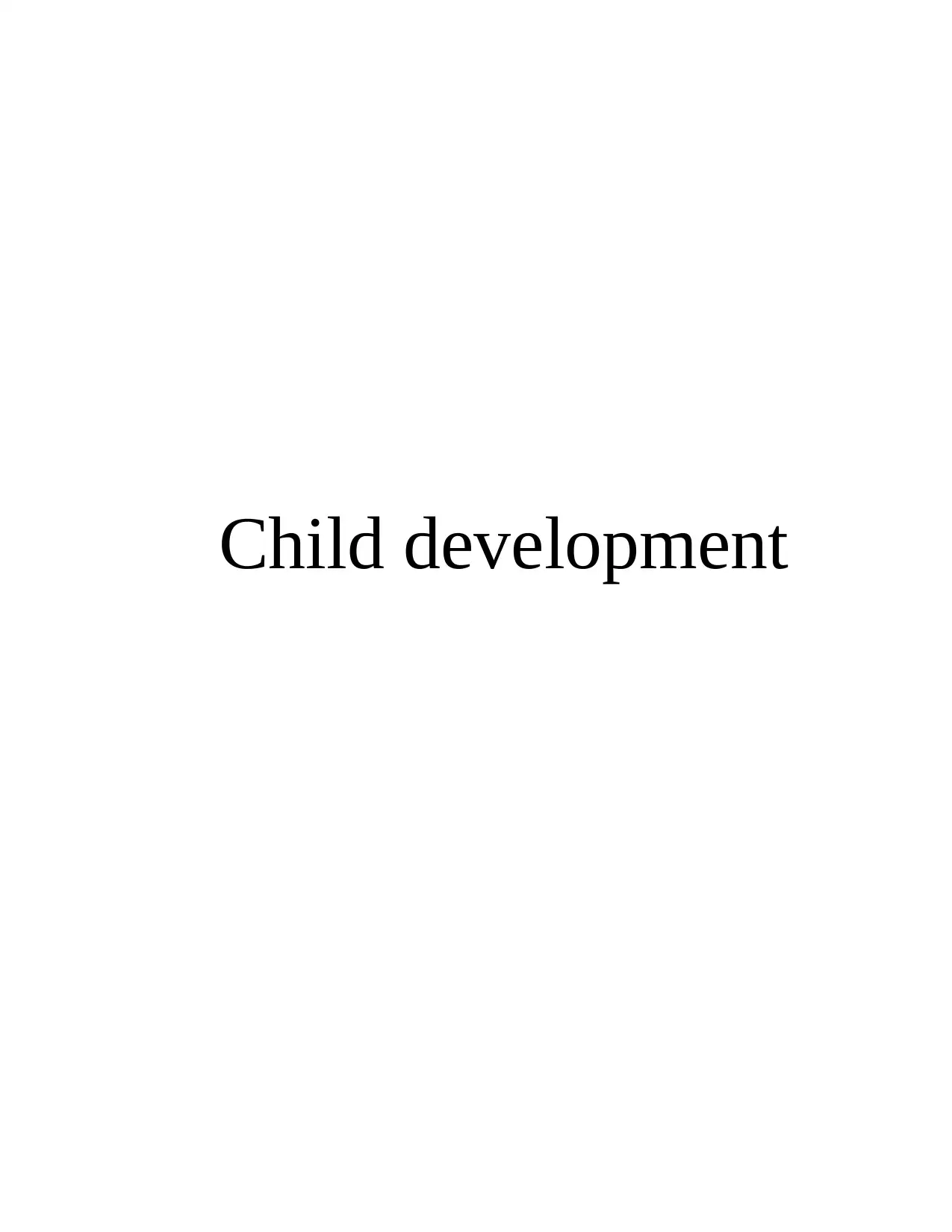
Child development
Secure Best Marks with AI Grader
Need help grading? Try our AI Grader for instant feedback on your assignments.
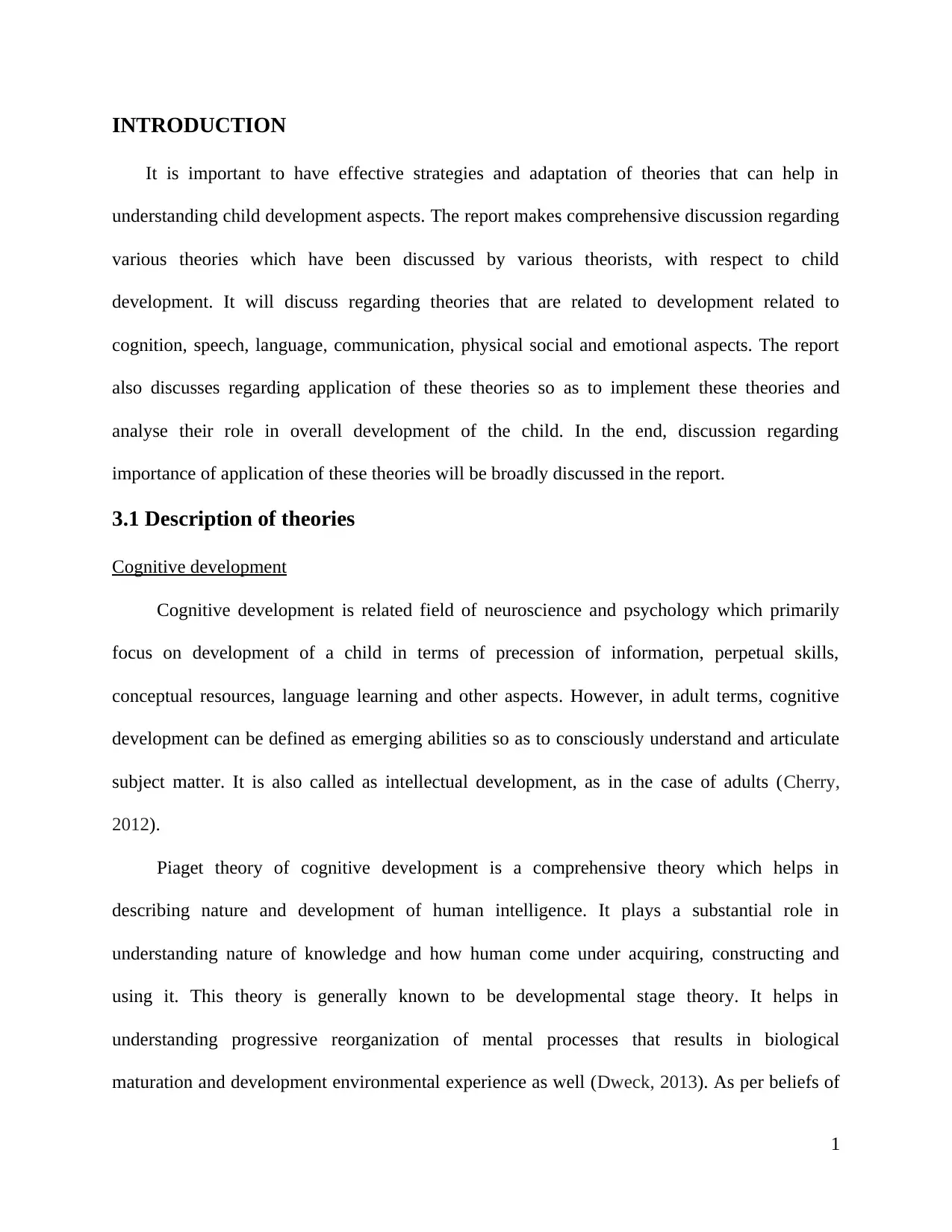
INTRODUCTION
It is important to have effective strategies and adaptation of theories that can help in
understanding child development aspects. The report makes comprehensive discussion regarding
various theories which have been discussed by various theorists, with respect to child
development. It will discuss regarding theories that are related to development related to
cognition, speech, language, communication, physical social and emotional aspects. The report
also discusses regarding application of these theories so as to implement these theories and
analyse their role in overall development of the child. In the end, discussion regarding
importance of application of these theories will be broadly discussed in the report.
3.1 Description of theories
Cognitive development
Cognitive development is related field of neuroscience and psychology which primarily
focus on development of a child in terms of precession of information, perpetual skills,
conceptual resources, language learning and other aspects. However, in adult terms, cognitive
development can be defined as emerging abilities so as to consciously understand and articulate
subject matter. It is also called as intellectual development, as in the case of adults (Cherry,
2012).
Piaget theory of cognitive development is a comprehensive theory which helps in
describing nature and development of human intelligence. It plays a substantial role in
understanding nature of knowledge and how human come under acquiring, constructing and
using it. This theory is generally known to be developmental stage theory. It helps in
understanding progressive reorganization of mental processes that results in biological
maturation and development environmental experience as well (Dweck, 2013). As per beliefs of
1
It is important to have effective strategies and adaptation of theories that can help in
understanding child development aspects. The report makes comprehensive discussion regarding
various theories which have been discussed by various theorists, with respect to child
development. It will discuss regarding theories that are related to development related to
cognition, speech, language, communication, physical social and emotional aspects. The report
also discusses regarding application of these theories so as to implement these theories and
analyse their role in overall development of the child. In the end, discussion regarding
importance of application of these theories will be broadly discussed in the report.
3.1 Description of theories
Cognitive development
Cognitive development is related field of neuroscience and psychology which primarily
focus on development of a child in terms of precession of information, perpetual skills,
conceptual resources, language learning and other aspects. However, in adult terms, cognitive
development can be defined as emerging abilities so as to consciously understand and articulate
subject matter. It is also called as intellectual development, as in the case of adults (Cherry,
2012).
Piaget theory of cognitive development is a comprehensive theory which helps in
describing nature and development of human intelligence. It plays a substantial role in
understanding nature of knowledge and how human come under acquiring, constructing and
using it. This theory is generally known to be developmental stage theory. It helps in
understanding progressive reorganization of mental processes that results in biological
maturation and development environmental experience as well (Dweck, 2013). As per beliefs of
1
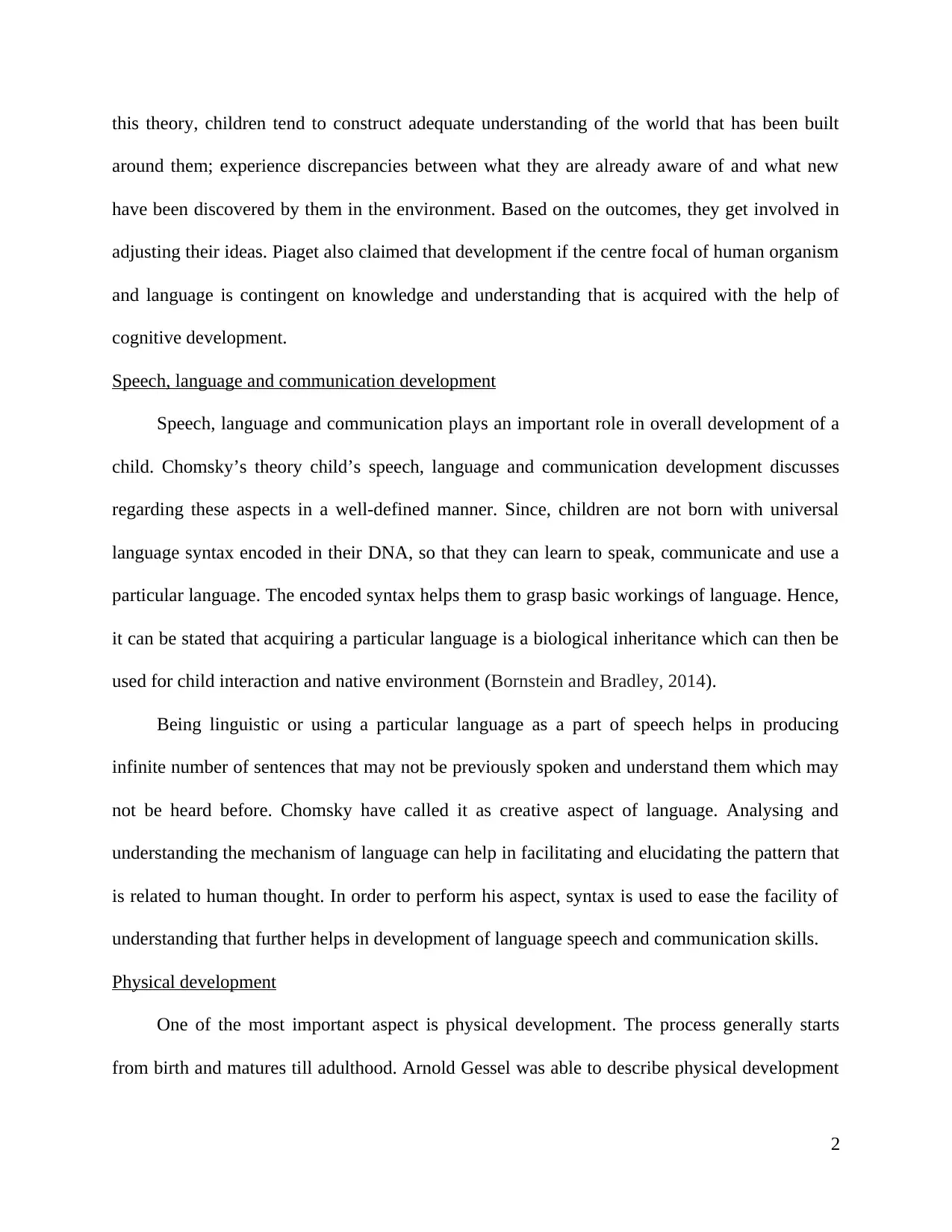
this theory, children tend to construct adequate understanding of the world that has been built
around them; experience discrepancies between what they are already aware of and what new
have been discovered by them in the environment. Based on the outcomes, they get involved in
adjusting their ideas. Piaget also claimed that development if the centre focal of human organism
and language is contingent on knowledge and understanding that is acquired with the help of
cognitive development.
Speech, language and communication development
Speech, language and communication plays an important role in overall development of a
child. Chomsky’s theory child’s speech, language and communication development discusses
regarding these aspects in a well-defined manner. Since, children are not born with universal
language syntax encoded in their DNA, so that they can learn to speak, communicate and use a
particular language. The encoded syntax helps them to grasp basic workings of language. Hence,
it can be stated that acquiring a particular language is a biological inheritance which can then be
used for child interaction and native environment (Bornstein and Bradley, 2014).
Being linguistic or using a particular language as a part of speech helps in producing
infinite number of sentences that may not be previously spoken and understand them which may
not be heard before. Chomsky have called it as creative aspect of language. Analysing and
understanding the mechanism of language can help in facilitating and elucidating the pattern that
is related to human thought. In order to perform his aspect, syntax is used to ease the facility of
understanding that further helps in development of language speech and communication skills.
Physical development
One of the most important aspect is physical development. The process generally starts
from birth and matures till adulthood. Arnold Gessel was able to describe physical development
2
around them; experience discrepancies between what they are already aware of and what new
have been discovered by them in the environment. Based on the outcomes, they get involved in
adjusting their ideas. Piaget also claimed that development if the centre focal of human organism
and language is contingent on knowledge and understanding that is acquired with the help of
cognitive development.
Speech, language and communication development
Speech, language and communication plays an important role in overall development of a
child. Chomsky’s theory child’s speech, language and communication development discusses
regarding these aspects in a well-defined manner. Since, children are not born with universal
language syntax encoded in their DNA, so that they can learn to speak, communicate and use a
particular language. The encoded syntax helps them to grasp basic workings of language. Hence,
it can be stated that acquiring a particular language is a biological inheritance which can then be
used for child interaction and native environment (Bornstein and Bradley, 2014).
Being linguistic or using a particular language as a part of speech helps in producing
infinite number of sentences that may not be previously spoken and understand them which may
not be heard before. Chomsky have called it as creative aspect of language. Analysing and
understanding the mechanism of language can help in facilitating and elucidating the pattern that
is related to human thought. In order to perform his aspect, syntax is used to ease the facility of
understanding that further helps in development of language speech and communication skills.
Physical development
One of the most important aspect is physical development. The process generally starts
from birth and matures till adulthood. Arnold Gessel was able to describe physical development
2
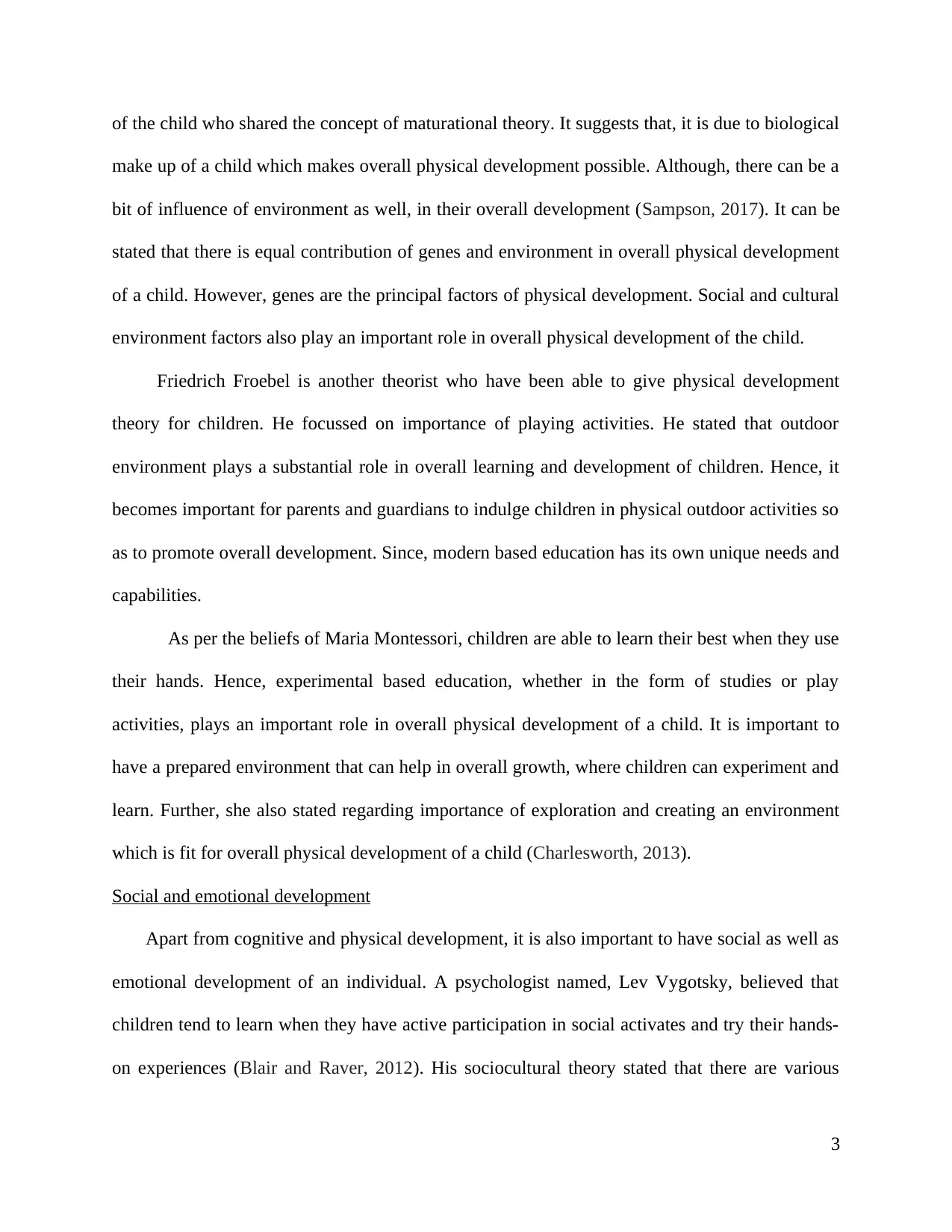
of the child who shared the concept of maturational theory. It suggests that, it is due to biological
make up of a child which makes overall physical development possible. Although, there can be a
bit of influence of environment as well, in their overall development (Sampson, 2017). It can be
stated that there is equal contribution of genes and environment in overall physical development
of a child. However, genes are the principal factors of physical development. Social and cultural
environment factors also play an important role in overall physical development of the child.
Friedrich Froebel is another theorist who have been able to give physical development
theory for children. He focussed on importance of playing activities. He stated that outdoor
environment plays a substantial role in overall learning and development of children. Hence, it
becomes important for parents and guardians to indulge children in physical outdoor activities so
as to promote overall development. Since, modern based education has its own unique needs and
capabilities.
As per the beliefs of Maria Montessori, children are able to learn their best when they use
their hands. Hence, experimental based education, whether in the form of studies or play
activities, plays an important role in overall physical development of a child. It is important to
have a prepared environment that can help in overall growth, where children can experiment and
learn. Further, she also stated regarding importance of exploration and creating an environment
which is fit for overall physical development of a child (Charlesworth, 2013).
Social and emotional development
Apart from cognitive and physical development, it is also important to have social as well as
emotional development of an individual. A psychologist named, Lev Vygotsky, believed that
children tend to learn when they have active participation in social activates and try their hands-
on experiences (Blair and Raver, 2012). His sociocultural theory stated that there are various
3
make up of a child which makes overall physical development possible. Although, there can be a
bit of influence of environment as well, in their overall development (Sampson, 2017). It can be
stated that there is equal contribution of genes and environment in overall physical development
of a child. However, genes are the principal factors of physical development. Social and cultural
environment factors also play an important role in overall physical development of the child.
Friedrich Froebel is another theorist who have been able to give physical development
theory for children. He focussed on importance of playing activities. He stated that outdoor
environment plays a substantial role in overall learning and development of children. Hence, it
becomes important for parents and guardians to indulge children in physical outdoor activities so
as to promote overall development. Since, modern based education has its own unique needs and
capabilities.
As per the beliefs of Maria Montessori, children are able to learn their best when they use
their hands. Hence, experimental based education, whether in the form of studies or play
activities, plays an important role in overall physical development of a child. It is important to
have a prepared environment that can help in overall growth, where children can experiment and
learn. Further, she also stated regarding importance of exploration and creating an environment
which is fit for overall physical development of a child (Charlesworth, 2013).
Social and emotional development
Apart from cognitive and physical development, it is also important to have social as well as
emotional development of an individual. A psychologist named, Lev Vygotsky, believed that
children tend to learn when they have active participation in social activates and try their hands-
on experiences (Blair and Raver, 2012). His sociocultural theory stated that there are various
3
Secure Best Marks with AI Grader
Need help grading? Try our AI Grader for instant feedback on your assignments.
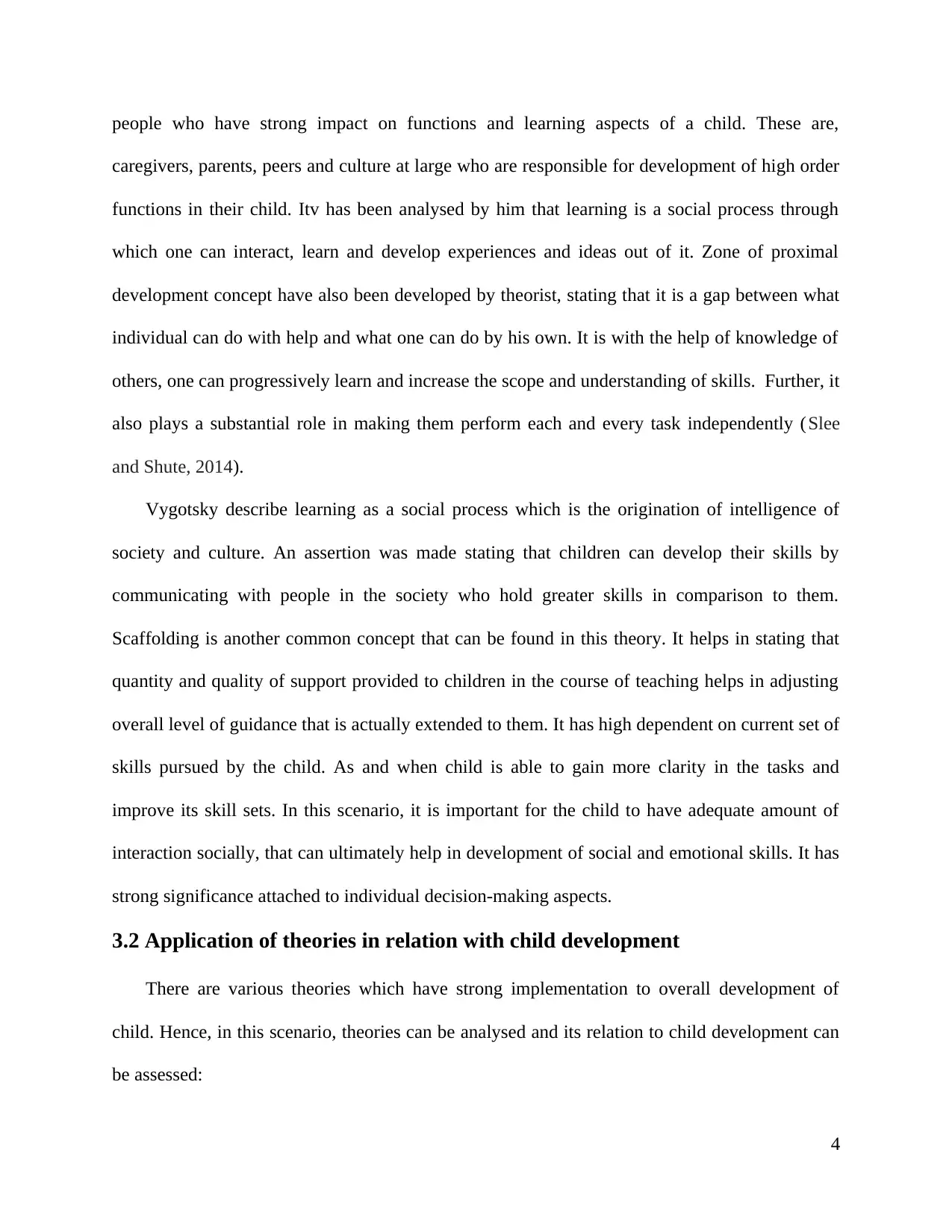
people who have strong impact on functions and learning aspects of a child. These are,
caregivers, parents, peers and culture at large who are responsible for development of high order
functions in their child. Itv has been analysed by him that learning is a social process through
which one can interact, learn and develop experiences and ideas out of it. Zone of proximal
development concept have also been developed by theorist, stating that it is a gap between what
individual can do with help and what one can do by his own. It is with the help of knowledge of
others, one can progressively learn and increase the scope and understanding of skills. Further, it
also plays a substantial role in making them perform each and every task independently (Slee
and Shute, 2014).
Vygotsky describe learning as a social process which is the origination of intelligence of
society and culture. An assertion was made stating that children can develop their skills by
communicating with people in the society who hold greater skills in comparison to them.
Scaffolding is another common concept that can be found in this theory. It helps in stating that
quantity and quality of support provided to children in the course of teaching helps in adjusting
overall level of guidance that is actually extended to them. It has high dependent on current set of
skills pursued by the child. As and when child is able to gain more clarity in the tasks and
improve its skill sets. In this scenario, it is important for the child to have adequate amount of
interaction socially, that can ultimately help in development of social and emotional skills. It has
strong significance attached to individual decision-making aspects.
3.2 Application of theories in relation with child development
There are various theories which have strong implementation to overall development of
child. Hence, in this scenario, theories can be analysed and its relation to child development can
be assessed:
4
caregivers, parents, peers and culture at large who are responsible for development of high order
functions in their child. Itv has been analysed by him that learning is a social process through
which one can interact, learn and develop experiences and ideas out of it. Zone of proximal
development concept have also been developed by theorist, stating that it is a gap between what
individual can do with help and what one can do by his own. It is with the help of knowledge of
others, one can progressively learn and increase the scope and understanding of skills. Further, it
also plays a substantial role in making them perform each and every task independently (Slee
and Shute, 2014).
Vygotsky describe learning as a social process which is the origination of intelligence of
society and culture. An assertion was made stating that children can develop their skills by
communicating with people in the society who hold greater skills in comparison to them.
Scaffolding is another common concept that can be found in this theory. It helps in stating that
quantity and quality of support provided to children in the course of teaching helps in adjusting
overall level of guidance that is actually extended to them. It has high dependent on current set of
skills pursued by the child. As and when child is able to gain more clarity in the tasks and
improve its skill sets. In this scenario, it is important for the child to have adequate amount of
interaction socially, that can ultimately help in development of social and emotional skills. It has
strong significance attached to individual decision-making aspects.
3.2 Application of theories in relation with child development
There are various theories which have strong implementation to overall development of
child. Hence, in this scenario, theories can be analysed and its relation to child development can
be assessed:
4
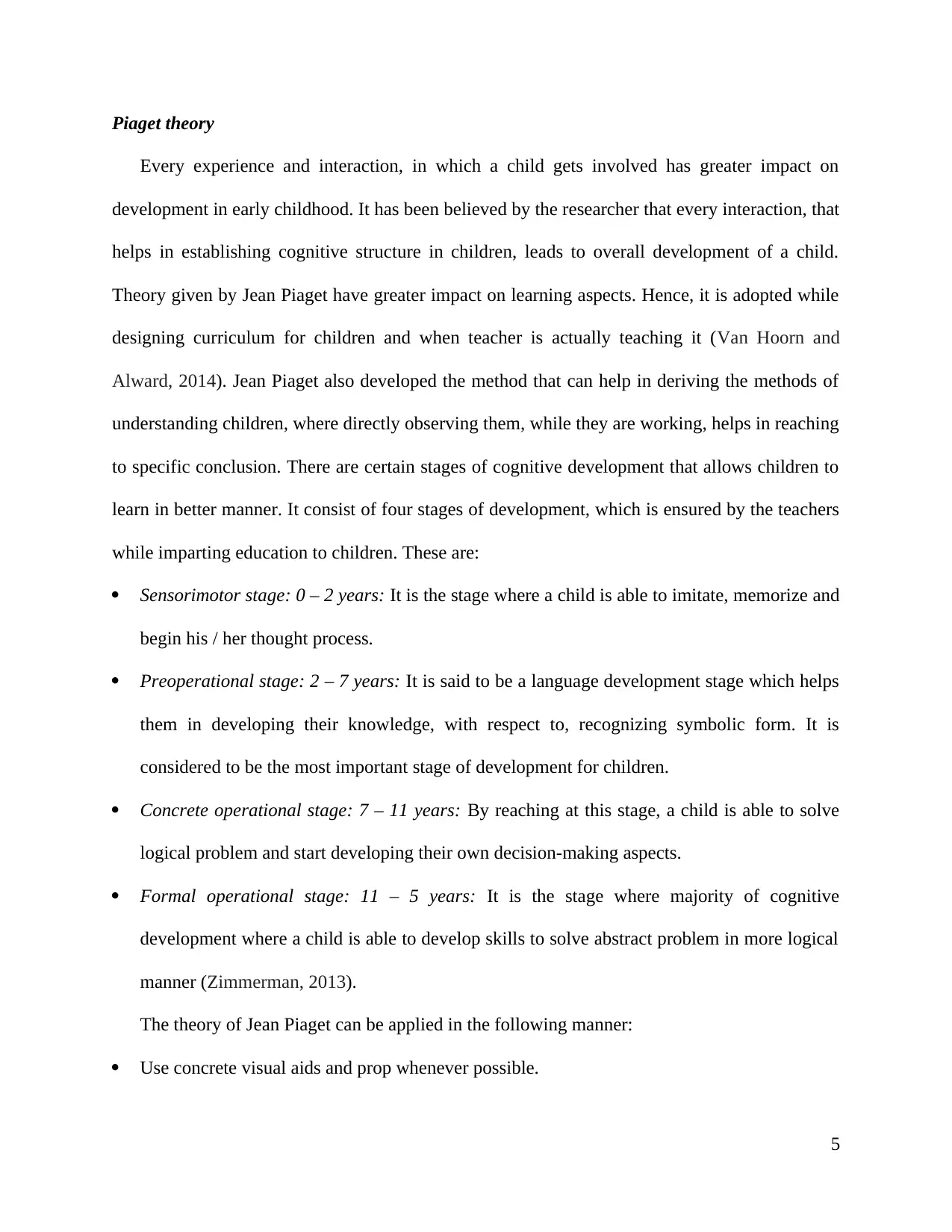
Piaget theory
Every experience and interaction, in which a child gets involved has greater impact on
development in early childhood. It has been believed by the researcher that every interaction, that
helps in establishing cognitive structure in children, leads to overall development of a child.
Theory given by Jean Piaget have greater impact on learning aspects. Hence, it is adopted while
designing curriculum for children and when teacher is actually teaching it (Van Hoorn and
Alward, 2014). Jean Piaget also developed the method that can help in deriving the methods of
understanding children, where directly observing them, while they are working, helps in reaching
to specific conclusion. There are certain stages of cognitive development that allows children to
learn in better manner. It consist of four stages of development, which is ensured by the teachers
while imparting education to children. These are:
Sensorimotor stage: 0 – 2 years: It is the stage where a child is able to imitate, memorize and
begin his / her thought process.
Preoperational stage: 2 – 7 years: It is said to be a language development stage which helps
them in developing their knowledge, with respect to, recognizing symbolic form. It is
considered to be the most important stage of development for children.
Concrete operational stage: 7 – 11 years: By reaching at this stage, a child is able to solve
logical problem and start developing their own decision-making aspects.
Formal operational stage: 11 – 5 years: It is the stage where majority of cognitive
development where a child is able to develop skills to solve abstract problem in more logical
manner (Zimmerman, 2013).
The theory of Jean Piaget can be applied in the following manner:
Use concrete visual aids and prop whenever possible.
5
Every experience and interaction, in which a child gets involved has greater impact on
development in early childhood. It has been believed by the researcher that every interaction, that
helps in establishing cognitive structure in children, leads to overall development of a child.
Theory given by Jean Piaget have greater impact on learning aspects. Hence, it is adopted while
designing curriculum for children and when teacher is actually teaching it (Van Hoorn and
Alward, 2014). Jean Piaget also developed the method that can help in deriving the methods of
understanding children, where directly observing them, while they are working, helps in reaching
to specific conclusion. There are certain stages of cognitive development that allows children to
learn in better manner. It consist of four stages of development, which is ensured by the teachers
while imparting education to children. These are:
Sensorimotor stage: 0 – 2 years: It is the stage where a child is able to imitate, memorize and
begin his / her thought process.
Preoperational stage: 2 – 7 years: It is said to be a language development stage which helps
them in developing their knowledge, with respect to, recognizing symbolic form. It is
considered to be the most important stage of development for children.
Concrete operational stage: 7 – 11 years: By reaching at this stage, a child is able to solve
logical problem and start developing their own decision-making aspects.
Formal operational stage: 11 – 5 years: It is the stage where majority of cognitive
development where a child is able to develop skills to solve abstract problem in more logical
manner (Zimmerman, 2013).
The theory of Jean Piaget can be applied in the following manner:
Use concrete visual aids and prop whenever possible.
5
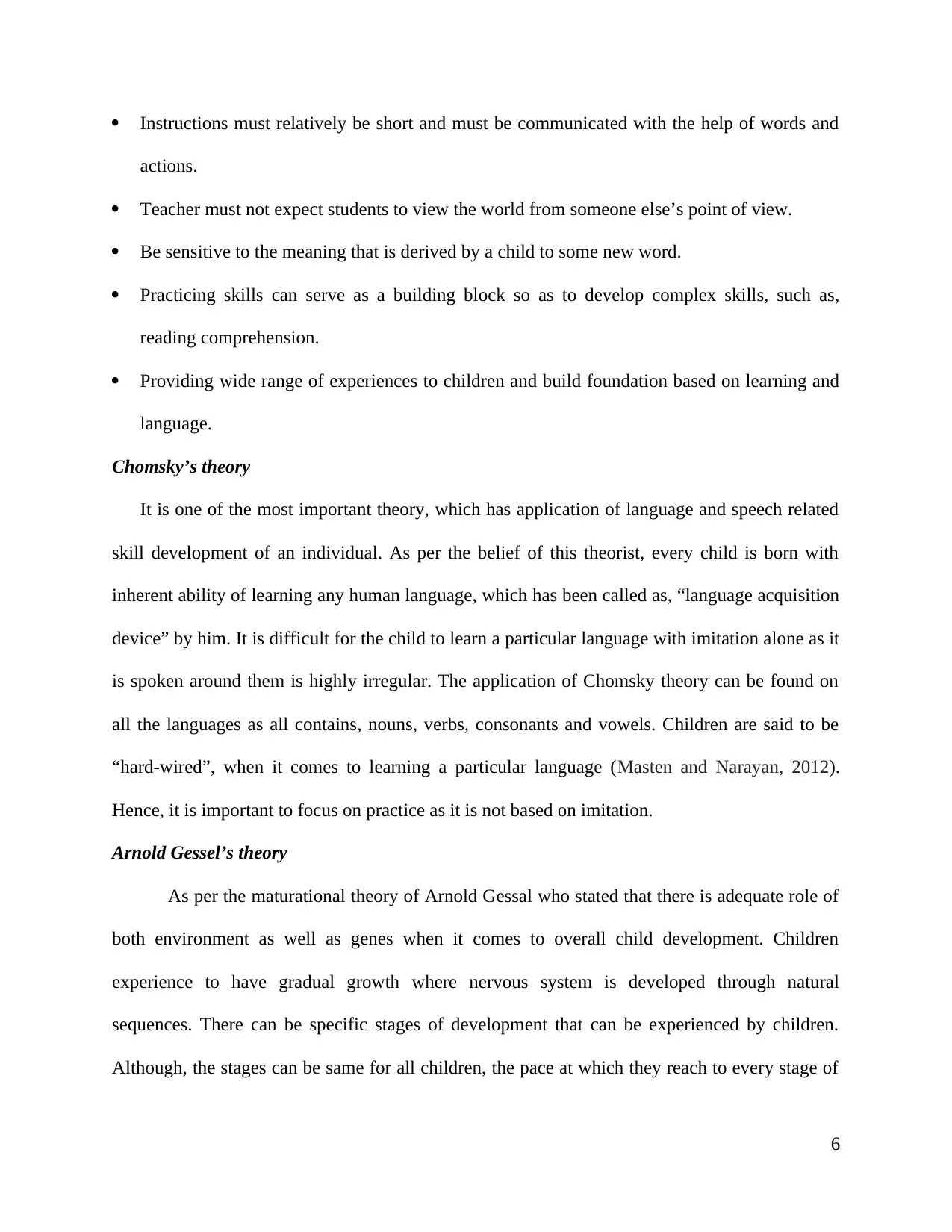
Instructions must relatively be short and must be communicated with the help of words and
actions.
Teacher must not expect students to view the world from someone else’s point of view.
Be sensitive to the meaning that is derived by a child to some new word.
Practicing skills can serve as a building block so as to develop complex skills, such as,
reading comprehension.
Providing wide range of experiences to children and build foundation based on learning and
language.
Chomsky’s theory
It is one of the most important theory, which has application of language and speech related
skill development of an individual. As per the belief of this theorist, every child is born with
inherent ability of learning any human language, which has been called as, “language acquisition
device” by him. It is difficult for the child to learn a particular language with imitation alone as it
is spoken around them is highly irregular. The application of Chomsky theory can be found on
all the languages as all contains, nouns, verbs, consonants and vowels. Children are said to be
“hard-wired”, when it comes to learning a particular language (Masten and Narayan, 2012).
Hence, it is important to focus on practice as it is not based on imitation.
Arnold Gessel’s theory
As per the maturational theory of Arnold Gessal who stated that there is adequate role of
both environment as well as genes when it comes to overall child development. Children
experience to have gradual growth where nervous system is developed through natural
sequences. There can be specific stages of development that can be experienced by children.
Although, the stages can be same for all children, the pace at which they reach to every stage of
6
actions.
Teacher must not expect students to view the world from someone else’s point of view.
Be sensitive to the meaning that is derived by a child to some new word.
Practicing skills can serve as a building block so as to develop complex skills, such as,
reading comprehension.
Providing wide range of experiences to children and build foundation based on learning and
language.
Chomsky’s theory
It is one of the most important theory, which has application of language and speech related
skill development of an individual. As per the belief of this theorist, every child is born with
inherent ability of learning any human language, which has been called as, “language acquisition
device” by him. It is difficult for the child to learn a particular language with imitation alone as it
is spoken around them is highly irregular. The application of Chomsky theory can be found on
all the languages as all contains, nouns, verbs, consonants and vowels. Children are said to be
“hard-wired”, when it comes to learning a particular language (Masten and Narayan, 2012).
Hence, it is important to focus on practice as it is not based on imitation.
Arnold Gessel’s theory
As per the maturational theory of Arnold Gessal who stated that there is adequate role of
both environment as well as genes when it comes to overall child development. Children
experience to have gradual growth where nervous system is developed through natural
sequences. There can be specific stages of development that can be experienced by children.
Although, the stages can be same for all children, the pace at which they reach to every stage of
6
Paraphrase This Document
Need a fresh take? Get an instant paraphrase of this document with our AI Paraphraser
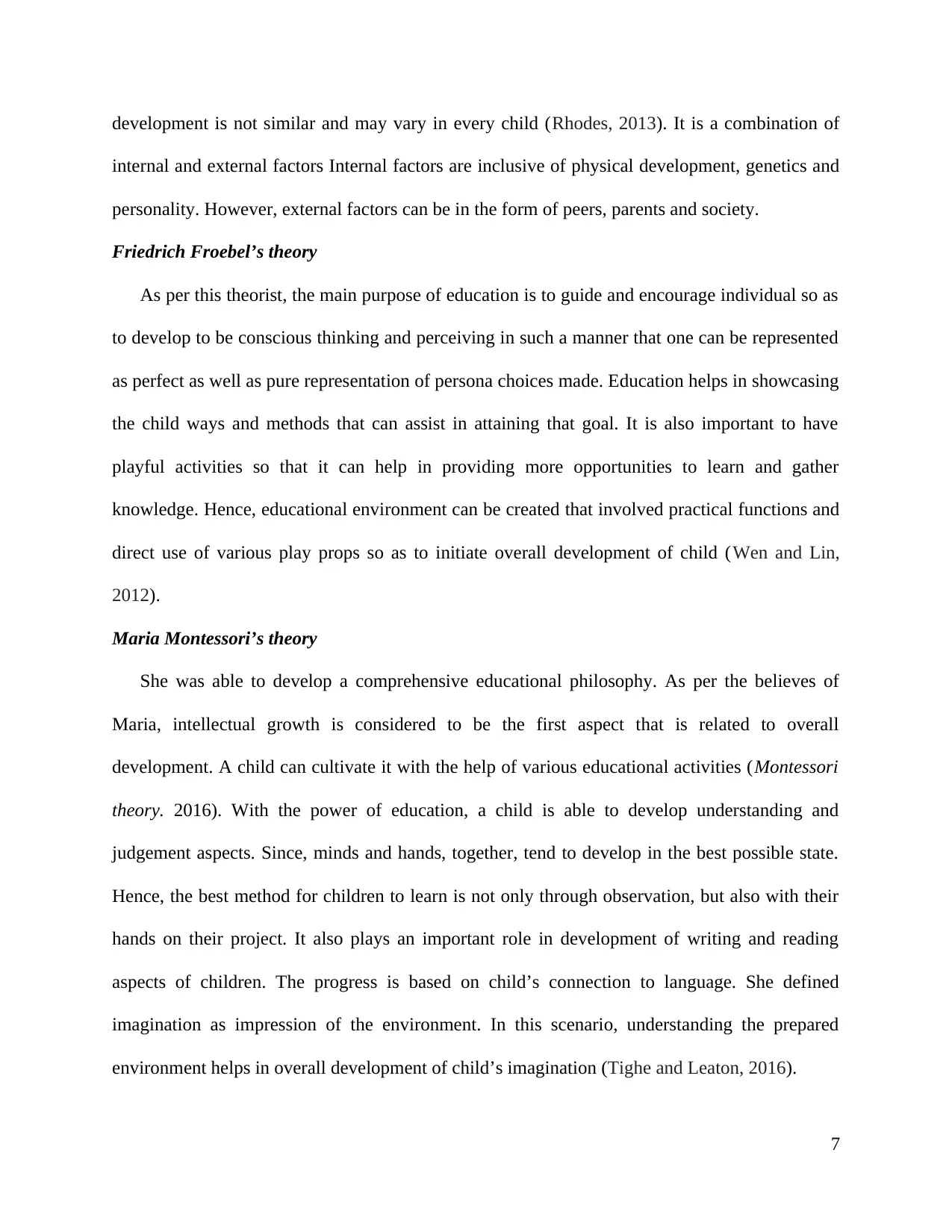
development is not similar and may vary in every child (Rhodes, 2013). It is a combination of
internal and external factors Internal factors are inclusive of physical development, genetics and
personality. However, external factors can be in the form of peers, parents and society.
Friedrich Froebel’s theory
As per this theorist, the main purpose of education is to guide and encourage individual so as
to develop to be conscious thinking and perceiving in such a manner that one can be represented
as perfect as well as pure representation of persona choices made. Education helps in showcasing
the child ways and methods that can assist in attaining that goal. It is also important to have
playful activities so that it can help in providing more opportunities to learn and gather
knowledge. Hence, educational environment can be created that involved practical functions and
direct use of various play props so as to initiate overall development of child (Wen and Lin,
2012).
Maria Montessori’s theory
She was able to develop a comprehensive educational philosophy. As per the believes of
Maria, intellectual growth is considered to be the first aspect that is related to overall
development. A child can cultivate it with the help of various educational activities (Montessori
theory. 2016). With the power of education, a child is able to develop understanding and
judgement aspects. Since, minds and hands, together, tend to develop in the best possible state.
Hence, the best method for children to learn is not only through observation, but also with their
hands on their project. It also plays an important role in development of writing and reading
aspects of children. The progress is based on child’s connection to language. She defined
imagination as impression of the environment. In this scenario, understanding the prepared
environment helps in overall development of child’s imagination (Tighe and Leaton, 2016).
7
internal and external factors Internal factors are inclusive of physical development, genetics and
personality. However, external factors can be in the form of peers, parents and society.
Friedrich Froebel’s theory
As per this theorist, the main purpose of education is to guide and encourage individual so as
to develop to be conscious thinking and perceiving in such a manner that one can be represented
as perfect as well as pure representation of persona choices made. Education helps in showcasing
the child ways and methods that can assist in attaining that goal. It is also important to have
playful activities so that it can help in providing more opportunities to learn and gather
knowledge. Hence, educational environment can be created that involved practical functions and
direct use of various play props so as to initiate overall development of child (Wen and Lin,
2012).
Maria Montessori’s theory
She was able to develop a comprehensive educational philosophy. As per the believes of
Maria, intellectual growth is considered to be the first aspect that is related to overall
development. A child can cultivate it with the help of various educational activities (Montessori
theory. 2016). With the power of education, a child is able to develop understanding and
judgement aspects. Since, minds and hands, together, tend to develop in the best possible state.
Hence, the best method for children to learn is not only through observation, but also with their
hands on their project. It also plays an important role in development of writing and reading
aspects of children. The progress is based on child’s connection to language. She defined
imagination as impression of the environment. In this scenario, understanding the prepared
environment helps in overall development of child’s imagination (Tighe and Leaton, 2016).
7
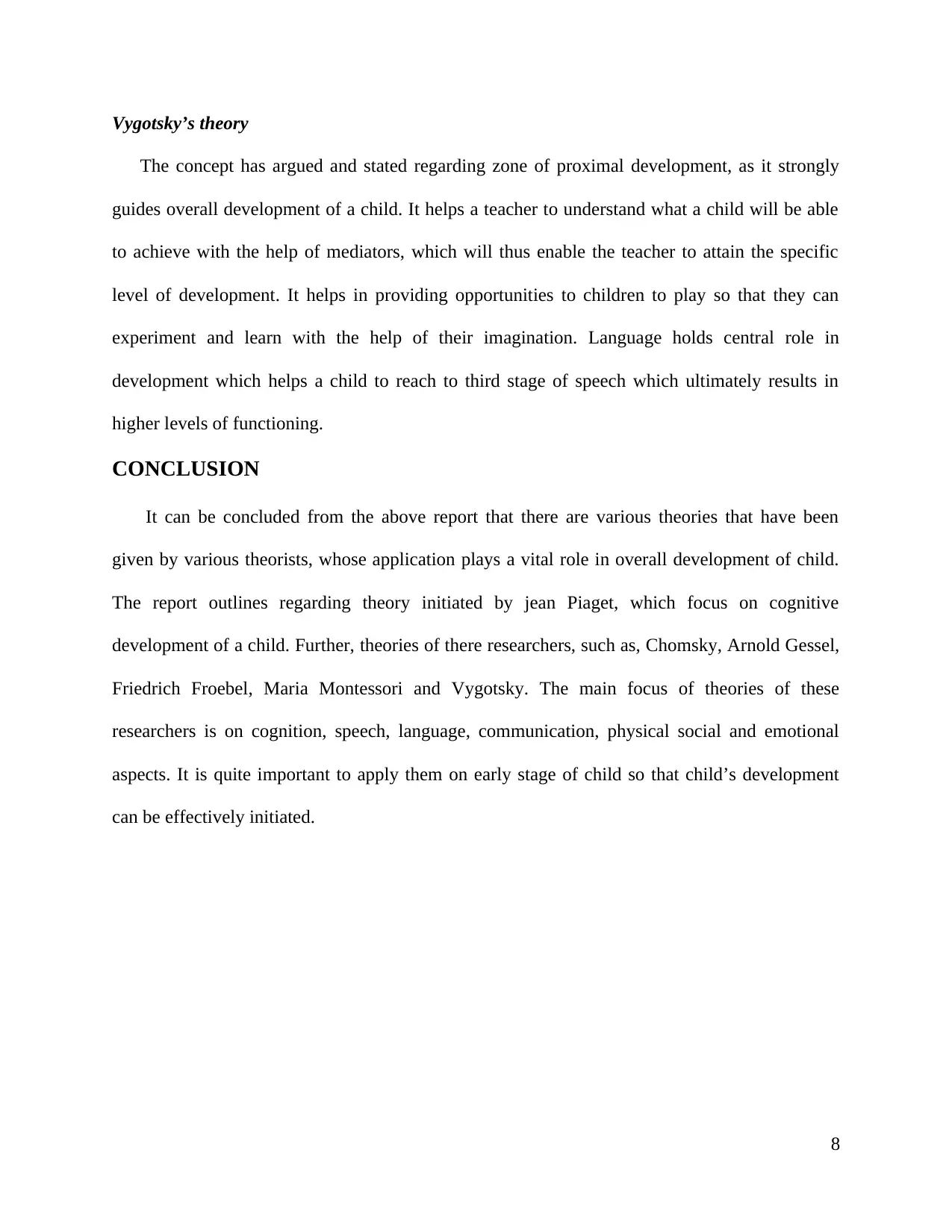
Vygotsky’s theory
The concept has argued and stated regarding zone of proximal development, as it strongly
guides overall development of a child. It helps a teacher to understand what a child will be able
to achieve with the help of mediators, which will thus enable the teacher to attain the specific
level of development. It helps in providing opportunities to children to play so that they can
experiment and learn with the help of their imagination. Language holds central role in
development which helps a child to reach to third stage of speech which ultimately results in
higher levels of functioning.
CONCLUSION
It can be concluded from the above report that there are various theories that have been
given by various theorists, whose application plays a vital role in overall development of child.
The report outlines regarding theory initiated by jean Piaget, which focus on cognitive
development of a child. Further, theories of there researchers, such as, Chomsky, Arnold Gessel,
Friedrich Froebel, Maria Montessori and Vygotsky. The main focus of theories of these
researchers is on cognition, speech, language, communication, physical social and emotional
aspects. It is quite important to apply them on early stage of child so that child’s development
can be effectively initiated.
8
The concept has argued and stated regarding zone of proximal development, as it strongly
guides overall development of a child. It helps a teacher to understand what a child will be able
to achieve with the help of mediators, which will thus enable the teacher to attain the specific
level of development. It helps in providing opportunities to children to play so that they can
experiment and learn with the help of their imagination. Language holds central role in
development which helps a child to reach to third stage of speech which ultimately results in
higher levels of functioning.
CONCLUSION
It can be concluded from the above report that there are various theories that have been
given by various theorists, whose application plays a vital role in overall development of child.
The report outlines regarding theory initiated by jean Piaget, which focus on cognitive
development of a child. Further, theories of there researchers, such as, Chomsky, Arnold Gessel,
Friedrich Froebel, Maria Montessori and Vygotsky. The main focus of theories of these
researchers is on cognition, speech, language, communication, physical social and emotional
aspects. It is quite important to apply them on early stage of child so that child’s development
can be effectively initiated.
8
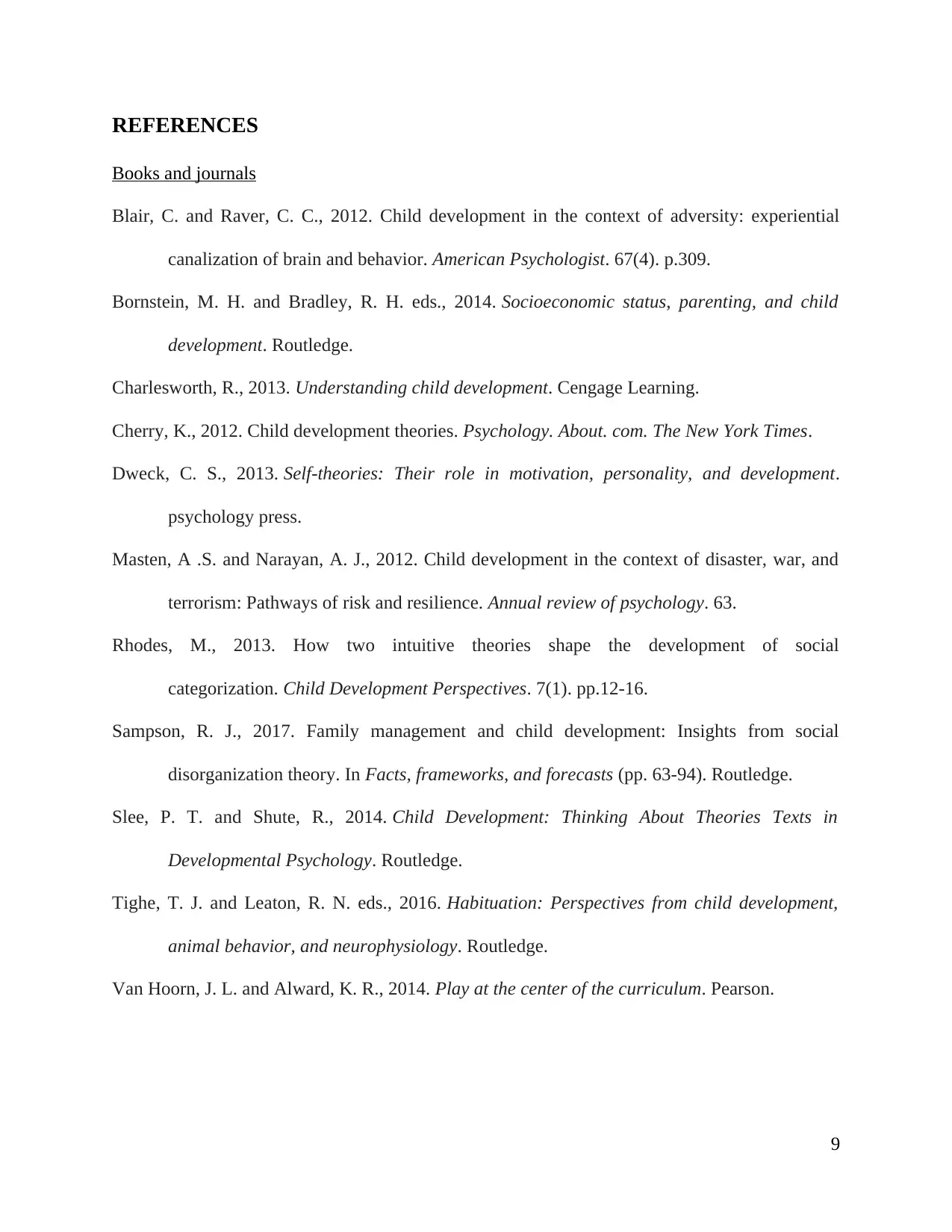
REFERENCES
Books and journals
Blair, C. and Raver, C. C., 2012. Child development in the context of adversity: experiential
canalization of brain and behavior. American Psychologist. 67(4). p.309.
Bornstein, M. H. and Bradley, R. H. eds., 2014. Socioeconomic status, parenting, and child
development. Routledge.
Charlesworth, R., 2013. Understanding child development. Cengage Learning.
Cherry, K., 2012. Child development theories. Psychology. About. com. The New York Times.
Dweck, C. S., 2013. Self-theories: Their role in motivation, personality, and development.
psychology press.
Masten, A .S. and Narayan, A. J., 2012. Child development in the context of disaster, war, and
terrorism: Pathways of risk and resilience. Annual review of psychology. 63.
Rhodes, M., 2013. How two intuitive theories shape the development of social
categorization. Child Development Perspectives. 7(1). pp.12-16.
Sampson, R. J., 2017. Family management and child development: Insights from social
disorganization theory. In Facts, frameworks, and forecasts (pp. 63-94). Routledge.
Slee, P. T. and Shute, R., 2014. Child Development: Thinking About Theories Texts in
Developmental Psychology. Routledge.
Tighe, T. J. and Leaton, R. N. eds., 2016. Habituation: Perspectives from child development,
animal behavior, and neurophysiology. Routledge.
Van Hoorn, J. L. and Alward, K. R., 2014. Play at the center of the curriculum. Pearson.
9
Books and journals
Blair, C. and Raver, C. C., 2012. Child development in the context of adversity: experiential
canalization of brain and behavior. American Psychologist. 67(4). p.309.
Bornstein, M. H. and Bradley, R. H. eds., 2014. Socioeconomic status, parenting, and child
development. Routledge.
Charlesworth, R., 2013. Understanding child development. Cengage Learning.
Cherry, K., 2012. Child development theories. Psychology. About. com. The New York Times.
Dweck, C. S., 2013. Self-theories: Their role in motivation, personality, and development.
psychology press.
Masten, A .S. and Narayan, A. J., 2012. Child development in the context of disaster, war, and
terrorism: Pathways of risk and resilience. Annual review of psychology. 63.
Rhodes, M., 2013. How two intuitive theories shape the development of social
categorization. Child Development Perspectives. 7(1). pp.12-16.
Sampson, R. J., 2017. Family management and child development: Insights from social
disorganization theory. In Facts, frameworks, and forecasts (pp. 63-94). Routledge.
Slee, P. T. and Shute, R., 2014. Child Development: Thinking About Theories Texts in
Developmental Psychology. Routledge.
Tighe, T. J. and Leaton, R. N. eds., 2016. Habituation: Perspectives from child development,
animal behavior, and neurophysiology. Routledge.
Van Hoorn, J. L. and Alward, K. R., 2014. Play at the center of the curriculum. Pearson.
9
Secure Best Marks with AI Grader
Need help grading? Try our AI Grader for instant feedback on your assignments.
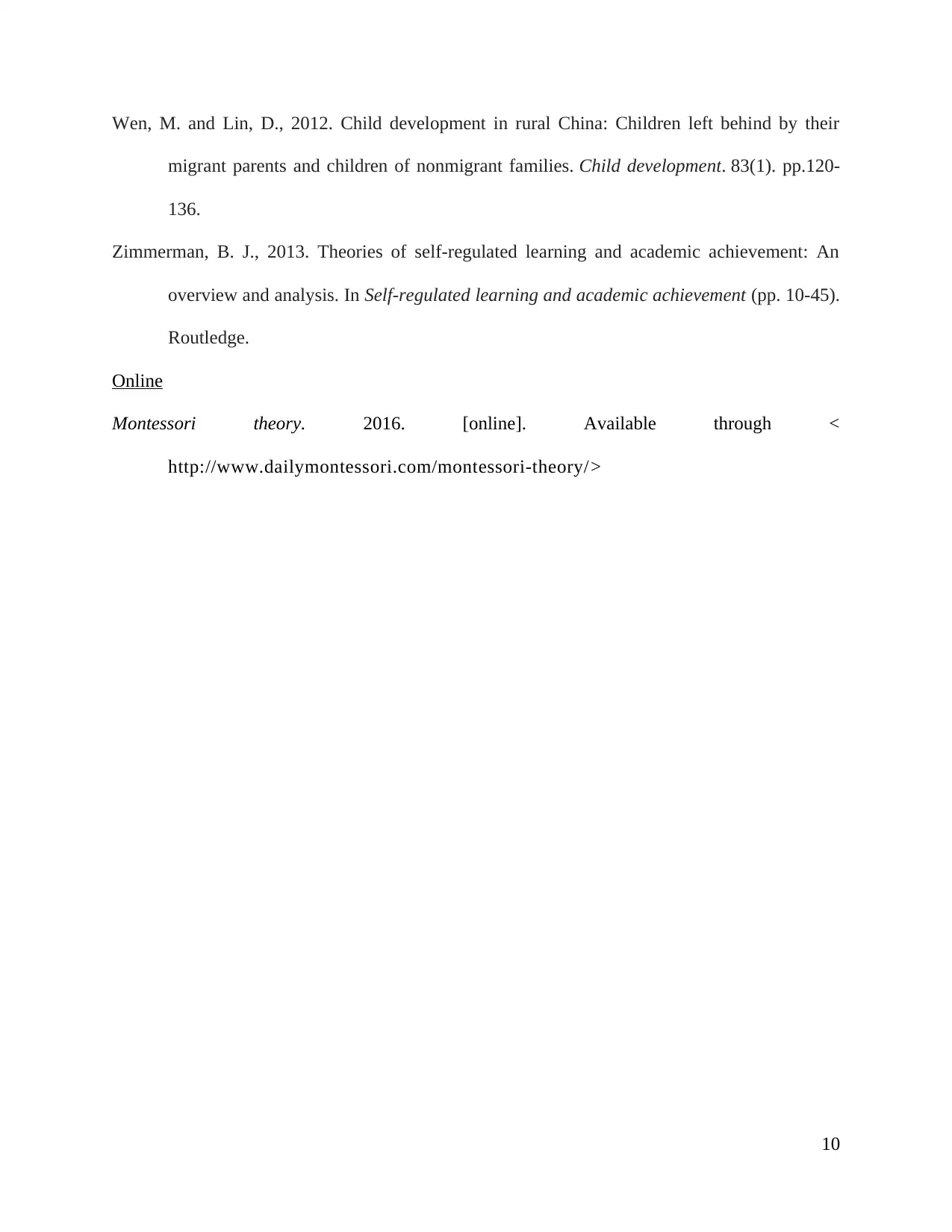
Wen, M. and Lin, D., 2012. Child development in rural China: Children left behind by their
migrant parents and children of nonmigrant families. Child development. 83(1). pp.120-
136.
Zimmerman, B. J., 2013. Theories of self-regulated learning and academic achievement: An
overview and analysis. In Self-regulated learning and academic achievement (pp. 10-45).
Routledge.
Online
Montessori theory. 2016. [online]. Available through <
http://www.dailymontessori.com/montessori-theory/>
10
migrant parents and children of nonmigrant families. Child development. 83(1). pp.120-
136.
Zimmerman, B. J., 2013. Theories of self-regulated learning and academic achievement: An
overview and analysis. In Self-regulated learning and academic achievement (pp. 10-45).
Routledge.
Online
Montessori theory. 2016. [online]. Available through <
http://www.dailymontessori.com/montessori-theory/>
10
1 out of 11
Related Documents
Your All-in-One AI-Powered Toolkit for Academic Success.
+13062052269
info@desklib.com
Available 24*7 on WhatsApp / Email
![[object Object]](/_next/static/media/star-bottom.7253800d.svg)
Unlock your academic potential
© 2024 | Zucol Services PVT LTD | All rights reserved.




